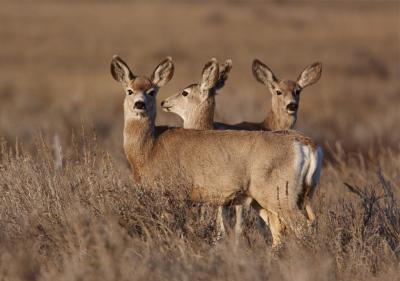Urban Wildlife
Urban Wildlife can be found throughout the City limits of Great Falls. Cohabiting with our wildlife neighbors can create challenges for residents and businesses in our community. To help reduce conflicts between humans and urban wildlife, Montana Fish, Wildlife, & Parks (FWP) developed a Living with Wildlife website. FWP resources include animal-specific information on:
- Wildlife Deterrence Methods
- Protecting People, Pets, and Property
- Injured or Orphaned Animals
- Disease Prevention
FWP asks property owners in the Great Falls area to avoid feeding deer and other wildlife since unnatural concentrations of wildlife increase the risk of spreading Chronic Wasting Disease and other diseases and can attract large predators.
5/8/24 - Cory Loecker with FWP Region 4 presented Deer Management options for the City of Great Falls during the City Commission Work Session on May 7, 2024. Management plans for other communities were provided in the Agenda Packet.
When should a resident call FWP for assistance with wildlife?
- Any human safety issues or concerns
- Significant property damage
- Potential diseased or sick animals
Do not call FWP for instances of nestling birds on the ground, solitary fawns, or other young or baby animals. These cannot be accepted and will be returned to the area where they were found or humanely euthanized.
Fish Wildlife & Parks – Region 4 Headquarters
4600 Giant Springs Road
Great Falls, MT 59405
Phone: (406) 454-5840
Fax: (406) 761-8477
Email: fwprg42@mt.gov
Office Hours: Monday - Friday, 8 a.m. - 5 p.m.
Disposal of Animal Carcasses
The City Sanitation Division allows for the disposal of animal carcasses in the City’s residential and commercial sanitation containers. However, carcasses should be double-bagged in plastic to avoid spreading diseases, such as Chronic Wasting Disease (CWD), to other animals.
When disposing of deer and other animal carcasses, FWP recommends using proper personal protection equipment, such as gloves and masks. If an animal carcass is located on a City roadway, residents can report and request the removal of the animal by calling (406) 771-1401.
Chronic Wasting Disease
- CWD infects members of the deer family, including elk, moose, mule deer, and white-tailed deer. CWD is not a virus, bacteria, or fungus and does not appear to infect cattle or other domesticated animals naturally.
- CWD is not known to infect humans. However, the Centers for Disease Control and Prevention (CDC) recommends that people not eat meat from infected animals and have their harvested animals tested before eating them if they were taken from an area where CWD is known to exist. For more information on CDC recommendations, please visit CDC's Chronic Wasting Disease in Animals
For more information on CWD, visit FWP’s Chronic Wasting Disease in Montana or call the Region 4 Headquarters at (406) 454-5840.
Wild Turkeys - FWP Tips for Living with Turkeys (not available on the FWP website)
- Remove preferred habitat areas and nesting habitat near homes, including any roosting limbs on trees & brushy areas near homes.
- Secure and remove any food attractants, such as bird feeders and fence gardens.
- Employ scare devices such as scarecrows and propane cannons.
Avian Influenza
Avian Influenza (AI) virus is a naturally occurring virus of birds. AI viruses are classified into two groups, based on the severity of disease they cause in infected poultry. Low pathogenic Avian Influenza viruses (LPAI) generally cause no clinical illness, or only minor symptoms. Highly Pathogenic Avian Influenza viruses (HPAI) are infectious and fatal to poultry and some species of wild birds.
For more background information, visit FWP's Avian Influenza information.
What to do if you find more than 5 sick or dead birds:
Sick/dead wild birds or wild mammals that meet HPAI testing criteria (below) can be reported to FWP by calling the Great Falls FWP office (406) 454-5840. Based on details of the report, FWP will prioritize which animals should be tested.
Animals that are often the highest priority for testing include:
- Multiple (5 or more) sick wild birds
- Sick/dead wild birds or mammals in close proximity to domestic poultry
- Sick/dead wild birds or mammals that have had very close contact with humans or dogs/cats
- Sick raptors exhibiting symptoms consistent of HPAI
- Wild carnivore/omnivore displaying symptoms consistent with HPAI
People should avoid contact with sick/dead wildlife and should avoid contact between their pets and sick/dead wildlife. If needed, any carcass that is not collected for testing can best be disposed by wearing disposable gloves, placing a plastic bag over the carcass and scooping the carcass into the bag, then tying or sealing the bag, double bagging it, and getting it into a garbage receptacle. Wash hands well after collecting any carcass.

